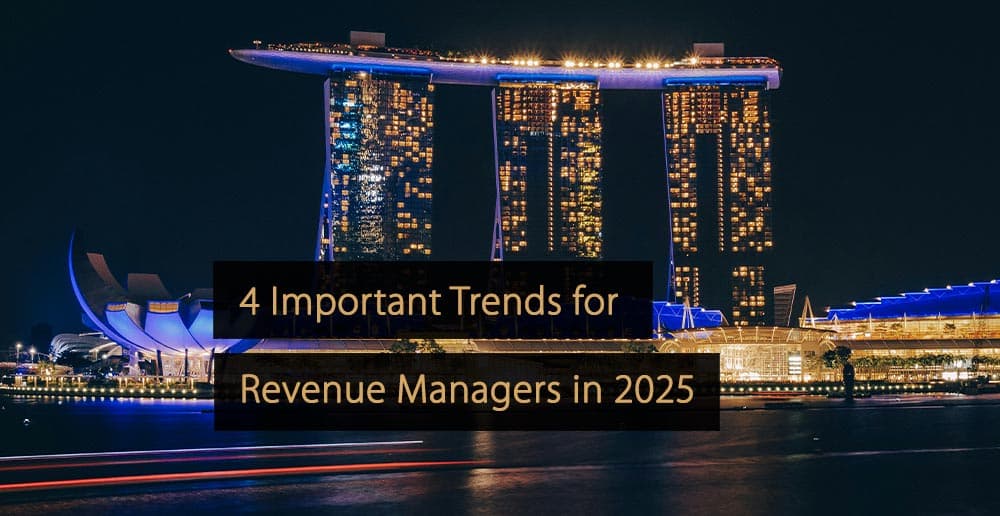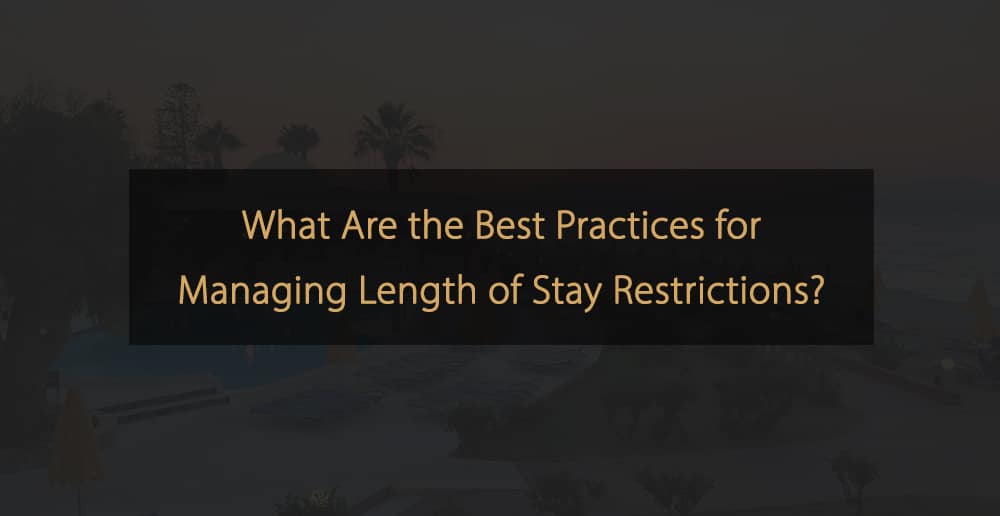Question for Our Revenue Management Expert Panel:
What advice can you offer to hotels implementing a B2B revenue management strategy? How does the strategy differ compared to a B2C audience and what are your top tips for success?
Industry Expert Panel
Our Industry Expert Panel exists out of professionals within the hospitality & travel Industry. They have comprehensive and detailed knowledge, experience in practice or management and are forward-thinking. They are answering questions about the state of the industry. They share their insights on topics like revenue management, marketing, operations, technology and discuss the latest trends.
Our Revenue Management Expert Panel
- Krunal Shah – Director of Revenue Management, The Biltmore Mayfair, LXR Hotels & Resorts
- Tanya Hadwick – Group Revenue & Yield Leader, SunSwept Resorts
- Diego Fernández Pérez De Ponga – Director of Revenue Management, Palladium Hotel Group
- Massimiliano Terzulli – Revenue Management Consultant, Franco Grasso Revenue Team
- Pablo Torres – Director, TEDUKA
- Alenka McMahon – Managing Director, Hotel Revenue Services Limited
- Damiano Zennaro – Founder, DZ Consulting
- Mariska van Heemskerk – Owner, Revenue Management Works
- Connor Vanderholm – CEO, Topline
- Ask Our Panel a Question
- Join Our Expert Panel
“There are some very basic but important factors around implementing B2B strategy effectively. Segmented markets, flexible costs, continuous demand and data analytics. We normally improvise revenue management by implementing direct and strategic practices into the B2B sales process. The sales department should constantly focus on conversion from their daily calls which will help in calculating the ratio of calls versus conversion.
As per my experience in this industry, the B2B market always depends on relationships, branding and positioning whereas the B2C market is more of a transactional focus, clear message to the end client and more of a quick business to make more revenue.”
“Identify the target market/ideal customer and focus on marketing to address their concerns, often around efficiency and logic. Conduct good market research and make sure you are tailoring to the target accounts. You still need a strong sales team and online presence and it’s wise to invest in a sales enablement programme. Typically in B2B, it’s about interpersonal relationships, education, gaining credibility and earning their trust.
I guess a key difference is B2B is interpersonal relationships, logic and long-term goals while B2C is often a transactional relationship based on the desires and short term goals of the customer (although in a high repeat resort as ours, there is a high level of interpersonal relationship with the B2C).”
“When implementing a B2B revenue management strategy for hotels, it’s important to focus on key principles. In the B2B segment, it’s better to have fewer clients and a wider network of providers. This means working with a smaller number of customers but having partnerships with various suppliers to offer a range of services.
The strategy differs from targeting individual customers (B2C). In B2B marketing, you need to use personalised approaches, like direct sales and industry-specific advertising. When it comes to pricing, B2B often involves negotiated contracts, volume discounts, and long-term agreements.
To succeed in B2B revenue management, follow these tips:
- Understand the specific needs of B2B clients and tailor your services accordingly.
- Build strong relationships with key industry partners to provide comprehensive offerings and stand out from competitors.
- Use a good customer relationship management (CRM) system to manage interactions, track client preferences, and improve customer satisfaction.
- Offer flexible pricing options, like negotiated contracts and customised packages.
- Provide excellent customer service to retain clients and build loyalty.”
“In general, I would be very careful with signing B2B contracts, as most of the time they cause problems of price disparity or rate leakage. Basically, tour operators and wholesalers who claim to be B2B end up selling rooms at negotiated rates on the B2C market, effectively making them public.
You should read the contract carefully and include clauses that allow you to close the unofficial channels that publish B2B rates, and if the problem persists, terminate the contract. Every now and then, some booking simulation should be done on these unofficial/uncontracted channels that publish lower rates, as this would allow you to trace the original supplier of the room inventory (checking the origin of the reservation via the channel manager).
In this sense, a B2B strategy certainly requires greater attention and tools capable of monitoring price parity. In any case, it is always better to work with free sale contracts, without allotments, or on request. You have to evaluate if it is worth it. For a very large property, it could make sense, whereas for a boutique hotel, it could certainly be enough to work with B2C channels and have greater transparency and control over your pricing distribution.”
“In an industry where direct booking volumes are growing rapidly, B2B sales are still one of the main sources of income for hotels. The key aspects to maximising profit from this source are:
- Pricing: The goal is to optimise revenue by adjusting prices to match the willingness of corporate clients to pay while considering the hotel’s overall revenue targets. This shall be done while making sure that OTAs and third parties do not offer better rates to the final customers than what you are offering on your own website.
- Inventory Management: Hotels need to allocate a certain portion of their inventory for B2B bookings while balancing it with other revenue channels, such as leisure travellers or individual bookings. It’s important to consider the cost of displacement here, i.e., to make sure that not too many or too few rooms are allocated or blocked for B2B sources.
- Channel Management: Losing control over your distribution can significantly damage your total revenue. That is why it’s really important to control inventory availability, rates, and restrictions across these channels, ensuring consistent pricing and availability information for potential clients.
- Data Analysis and Forecasting: By analysing historical data, market trends, and demand patterns, one can predict demand and adjust pricing and inventory allocations accordingly to maximise revenue from B2B transactions (linking it to the previous point about displacement).
- Relationship Management: Building and maintaining strong relationships with corporate clients and OTAs is vital for B2B revenue management. It’s a challenging ecosystem and having the right people in the right roles can make a substantial difference.”
“The main difference is the audience. B2C customers are looking for personalisation and a direct emotional connection with the hotel. B2B will ”open doors” via other businesses and their sophisticated post-sales marketing can create loyalty. It is important to understand both businesses and build the right channel mix.”
“When distributing your rooms, the “mantra” should be: distribute as much as you wish as long as you keep full control of your rates and inventory. Unfortunately, this often does not happen in the B2B onward distribution landscape and in many cases, hotels are challenged in the rate parity field for example. B2C distribution is generally much more transparent and under control – however, for a successful distribution, the same recommendation should be applied.”
“Make sure you have a clear understanding of how the client works. How will they sell your rooms and to whom? Is this a market you are not strong in selling yourselves? This will determine the kind of pricing they will get from you. Be careful with giving out fixed rates as they are a huge source of parity issues within the market. The only way this will work is if they sell outside your regular booking patterns, in closed circuits where the room rates cannot be retrieved. Always look for options where you can give out flexible rates, derived from your BAR, so you are sure that if the market drops/increases you are not stuck with the wrong rates.”
“Hotels implementing a B2B strategy should have a plan for volume discounting based on anticipated production. Use historical data where possible, but ultimately steeper discounts should only be given to clients presenting additional volumes of room nights over need periods. B2C is a significantly different dynamic where the individual is paying. They tend to prioritise value for money vs B2B that values consistency and ease.”
Ask a Question & Join Our Expert Panel
Would you like a question to be answered by our Industry Expert Panel? Or would you like to join our community of experts and share your experience, insights, and knowledge with fellow industry professionals? Via the buttons below you can submit a question or submit a request to become part of our expert panel.
More Tips to Grow Your Business
Revfine.com is the leading knowledge platform for the hospitality and travel industry. Professionals use our insights, strategies, and actionable tips to get inspired, optimize revenue, innovate processes, and improve customer experience.Explore expert advice on management, marketing, revenue management, operations, software, and technology in our dedicated Hotel, Hospitality, and Travel & Tourism categories.
















Leave A Comment